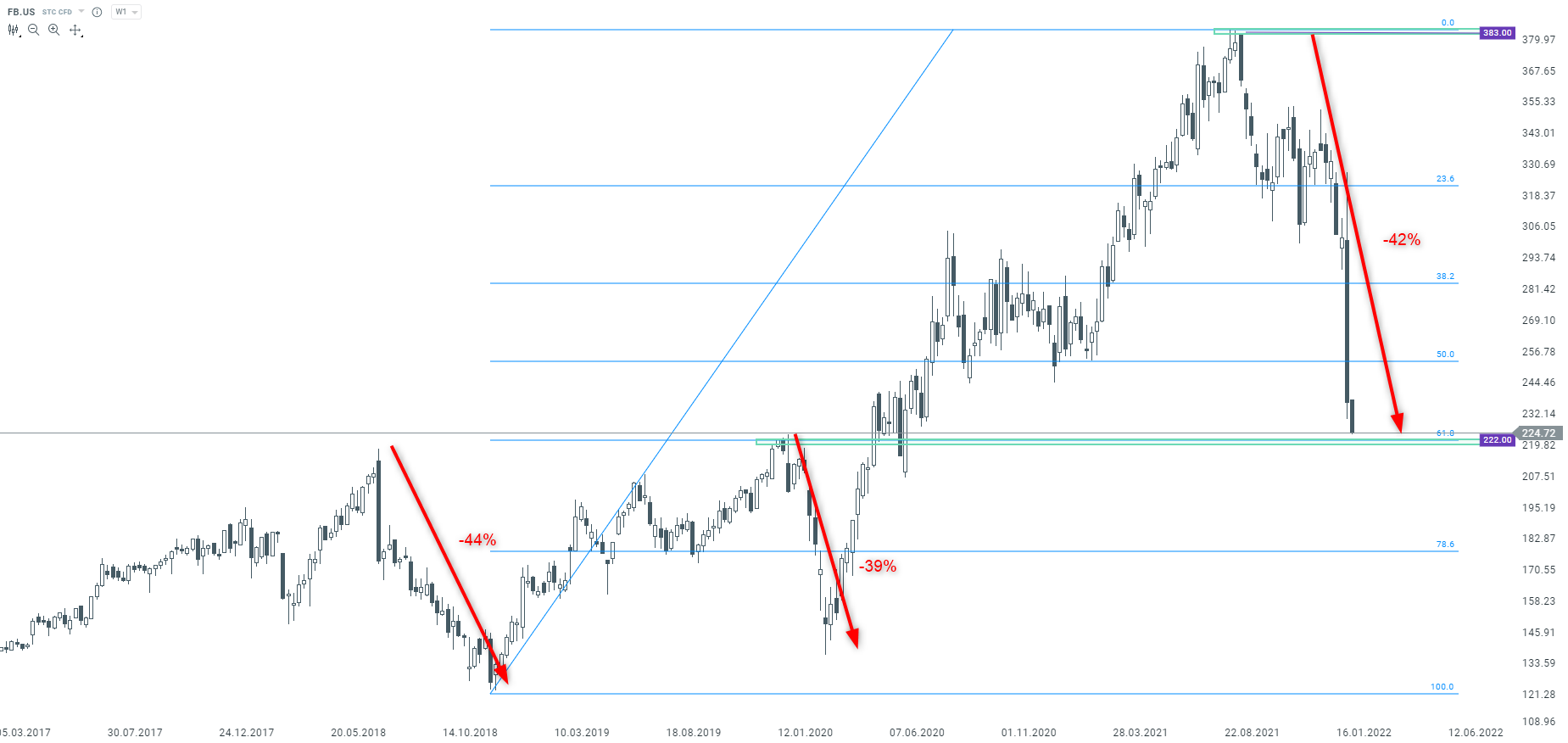Shares of Meta Platforms (FB.US) are falling amid growing concerns over user data security regulations and weaker forecasts.
Meta Platforms has seen a significant cut in its earnings per share estimates for 2022. Analysts are under no illusions about the deteriorating profitability of Meta. Until recently, the company's price-to-earnings forecast ratio was hovering near 20, slightly below levels seen in previous quarters. However, a significant share price decline has pushed the price-to-forecast earnings ratio down to around 15 points, even in spite of lower earnings and forecasts. The company no longer appears as expensive as it used to but experts indicate that woes for the stock may not be over yet.
Investor concerns have also increased amid the announced departure of Mark Zuckerberg's longtime advisor Peter Thiel. Thiel's departure in the context of the company's uncertain situation and high market volatility has caused fear among investors.
Problematic position of regulators
The European Union wants to better protect the personal data of its citizens and has announced strict controls over how those are transferred to the US. This poses a big problem for Meta Platforms because the company has always relied on customer data to fund its own advertising operations.
Threats made by the social media giant - considering shutting down sites like Instagram and Facebook in Europe if the EU does not change its stance - can be seen as an act of desperation. EU regulators, most notably Axel Voss, seem determined to keep pushing for new regulations that strengthen data protection, and Meta Platforms' threats do not seem to make much of an impact. It's worth noting that shutting down services in the EU would entail massive losses for Meta Platforms.
Investment in an uncertain future
The company has recently been spending massive amounts of money on a digital transformation called 'Metaverse'. Investors may be concerned that the size of this investment is too large for a new trend that is still uncertain. Meta Platforms increased Metaverse-related revenue by 22% in Q4 2021, while the company's expenses increased by as much as 48%. The market wasn't prepared for the investment to translate into such a big jump in total spending - from $71.2 billion the previous year to $92.5 billion in 2021.
The potential blocking of services in Europe could result in an exodus of Meta Platforms customers to rival platforms like TikTok and Snapchat. In the context of threats from Meta Platforms, slower growth in company's active user base, weaker financial forecasts and multi-billion dollar outlays in the uncertain Metaverse space, it can be assumed that investors who value safety may walk away from the company in order to avoid risks that the investment in Meta entails currently, and will only become interested in it once a there is a clearplan for the future.
It seems that this may not be the end of Meta Platforms' problems in the near future. The first half of the year promises to be bumpy for the company, which is why investors are reluctant to look towards it. On the other hand, the company is so "cheap" in terms of valuations that it may once again attract the attention of the market.
 While a recent sell-off on Meta Platforms (FB.US) is the largest on the record in absolute terms, the stock has experienced some pullbacks that were similar in percentage terms. Taking a look at the chart on a weekly interval, we can see that the zone at 61.8% retracement looks to be a key support for now ($222 area). Source: xStation5
While a recent sell-off on Meta Platforms (FB.US) is the largest on the record in absolute terms, the stock has experienced some pullbacks that were similar in percentage terms. Taking a look at the chart on a weekly interval, we can see that the zone at 61.8% retracement looks to be a key support for now ($222 area). Source: xStation5

Economic calendar: NFP data and US oil inventory report 💡

Daily summary: Weak US data drags markets down, precious metals under pressure again!

Datadog in Top Form: Record Q4 and Strong Outlook for 2026

US Open: Wall Street rises despite weak retail sales


